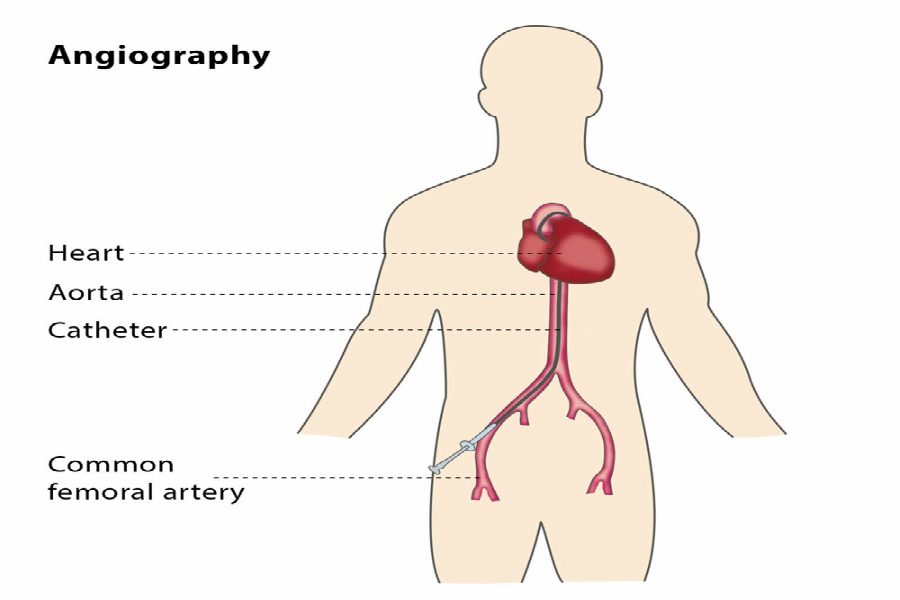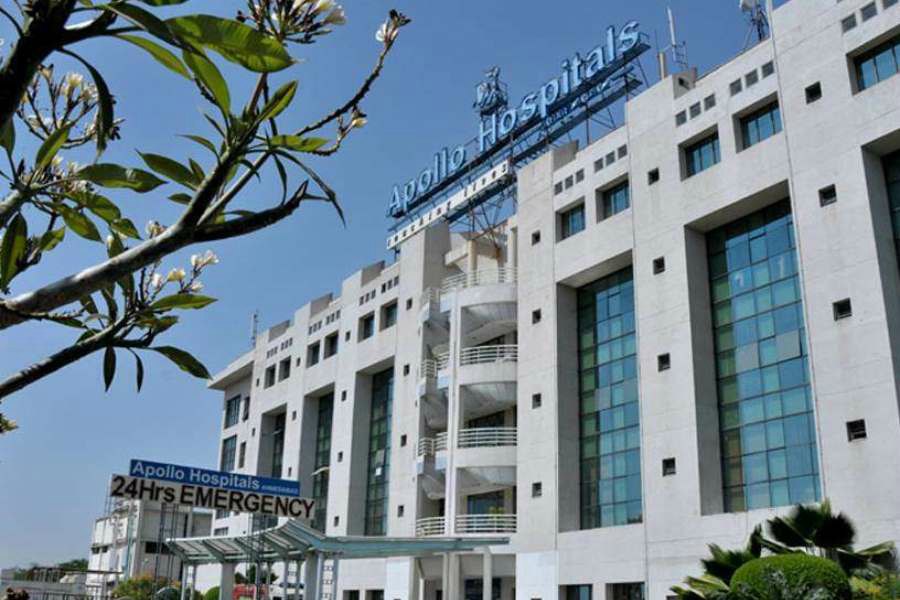
Overview
Angiography, also known as arteriography is an imaging technique which is used to look inside the lumen of heart, arteries, veins and different blood vessels. This test is used to study if there is any blocked, narrowed, enlarged, or malformation within the arteries or veins in any part of the body like heart, brain, legs, abdomen etc.
In angiogram, a typical dye that is visible under the X-Ray machine is injected through thin, flexible tube called catheter. The dye starts to flow within the blood vessels making it possible for the X-Ray machine to capture images and also see if there is narrowed or blocked area of abnormal blood flow.
The chemical of the dye isn’t lethal for your body and is eliminated later by your kidneys through urine.
Generally, the different types of angiogram tests include the below (depending on where the tube is inserted on the body):
- Coronary angiography
- Cerebral angiography
- Pulmonary angiography
- Renal angiography
SYMPTOMS
Angiography shows the flow of blood within the blood vessels. Thus, your doctor can order angiography if they suspect there is a blood flow issue in your blood vessels or heart chambers. The primary suspects of why an angiography is done are:
- To detect if your arteries are narrowing down i.e. atherosclerosis which would also signify that you are at a risk of heart attack or stroke
- In case of any atypical pain in jaw, neck or arm which is inconclusive in other tests
- In case you have reduced blood supply to leg muscles that is at risk of peripheral arterial diseases or claudication or leg cramps. These are generally common with patients suffering from high blood pressure.
- To visualize the flow of blood to and from brain that is to detect any aneurysm
- It can also be used in intervention work on coil embolized aneurysms
- In case of angina or severe chest pain when blood supply to heart is restricted
- In case of blood clots or blockage in the arteries supplying blood in your lungs that is pulmonary embolism
- If any abnormalities are detected during ECG or EKG or cardiac stress test
- In case of blockage in blood supply to your kidneys
- In case of heart attack
However, it is important to note that angiography is not a definitive diagnostic test for atheroma or atherosclerosis.
DIAGNOSIS
The diagnosis and evaluation of angiography depends on the type of angiography that is done on the patient. An angiogram basically helps the doctor to evaluate whether you need treatments such as angioplasty or stent or coronary bypass surgery or any other form of invasive medical therapy.
RISK FACTORS
As angiography is an invasive procedure hence it has slightly higher risk than other non invasive tests. The risks include:
- Bleeding under skin
- Bruising
- Allergy to the contrast dye material
- Nick in artery or any other form of damage due to catheter
- Heart attack
- Stroke
- Tissue damage due to X-ray radiation
- Serious bleeding
- Infection
- Arrhythmias
POST-OPERATIVE CARE
After the procedure you must stay on bed for the next 6 hours at least keeping the bandaged area as still as possible. In case the doctors sued an angio seal you should stay flat on your back for at least 2 hours. It is natural to feel a pea sized lump or slight uncomfort or mild tenderness in that area. However in case you feel as swelling/pain/ bleeding inform the healthcare team immediately.
The instructions for discharging
- As mentioned a small lump or mild tenderness is normal. You can take pain reliever like ibuprofen and apply some warm compresses in the area.
- Sometimes mild headache is natural.
- You need to drink plenty of fluids especially water for the next few days so that the contrast material is flushed out of the system
- Do not drive at least for the next 3 days or as your doctor prescribes
- Do not opt for any heavy sports or try to lift anything heavier than 10 pounds
- You can take a bath after 24 hours of the procedure
- But make sure no bath tubs, hot tubs or swimming for at least 3 days
- Remove the bandage before bathing, gently clean and use mild sops and water in the area. Pat dry and apply new bandage.
- In case of steri-strips in place allow them to fall off
- Keep checking for any sign of infection/redness/yellowish or greenish discharge/warm sensation etc.
- Keep your dressing clean dry and sterile
- Keep changing the dressing
- Do not apply any cream lotion or ointments
- In case bleeding occurs lie down and apply pressure on the area
- If you are given an angio seal your body will absorb the collagen in about 60- 90 days
- In case your temperature increases above 101.5 degree call doctor for help
- In case you find any signs of infection/swelling/numbness/ separation of infection call doctor immediately.
TREATMENT
There are a few tips your healthcare specialist will ask you to follow before and during the procedure.
Before the procedure
You will be admitted a day prior to the procedure so that the healthcare team can do a detailed medical examination including your past medical records, family history, history of past allergies etc. Then the medical team will check you for vital signs like blood pressure and pulse pressure etc.
Before the procedure, you need to have empty stomach. So, your doctor will probably ask you to stop eating or drinking for 6-8 hours before the scheduled time. You will be asked to empty your bladders. Any kind of piercing, jewelry, or any contact lenses or anything you are wearing will be removed and you will have to change to a hospital gown. Also an intravenous IV line will be administered in your arm.
During the procedure
- You will be asked to lie back
- Your heart and pulse pressure will be constantly monitored
- Sometimes mild sedative are given to help you to relax
- Generally the femoral artery of your groin are selected as access point however an area on arm or any chosen artery can also be selected
- The area is cleaned, numbed and then catheter is passed on through artery to the heart. The insertion of catheter should be absolutely painless.
- Once the catheter is in its place the dye is injected, you might feel a sensation of warmth.
- The X-ray images are taken to see the flow of blood.
- The procedure generally lasts for 30-40 minutes.
- The patients spend a day before the procedure, a day during the procedure and 2-3 days to recover and be fit for flying back to home country.
FACTORS AFFECTING COST
The cost for an angiogram will depend on the following –
- The charges of the cath lab
- The charges of drugs administered
- The physician fees
- The type of room chosen for the procedure
- The type of angiography (coronary, arms, groin etc.)
FAQ
An Angiogram is a test to check if the coronary arteries are blocked and the extent of the blockage. It is not a surgery but the results of the test provides guidance on the next steps to be followed by the surgeons – whether to insert stents, go for coronary artery bypass (CABG) or other surgical procedures.
- You will be taken to the hospital’s cath lab
- A spot on your groin or arm will be made numb and a caterer will be inserted up to the heart
- Special fluid goes up the arteries. This fluid is visible on the x-ray image
- Physician will suggest the right form of treatment based on the x-ray image displayed
A local anesthetic will be administered to numb the area where the catheter will be inserted. The needle prick is just like what you feel when getting an injection, and won’t be major. Also there won’t be any pain when the tube is inserted.
Patients will need to remain for 30 minutes to 2 hours after the angiogram. A discharge is usually given within the same day.
- Don’t eat or drink anything after midnight of the day of the exam
- Check with the physician about the insulin dosage in case you are suffering from diabetes
- Carry all your medications and medical file to the hospital on the day of the exam.


 Best Hospitals
Best Hospitals















